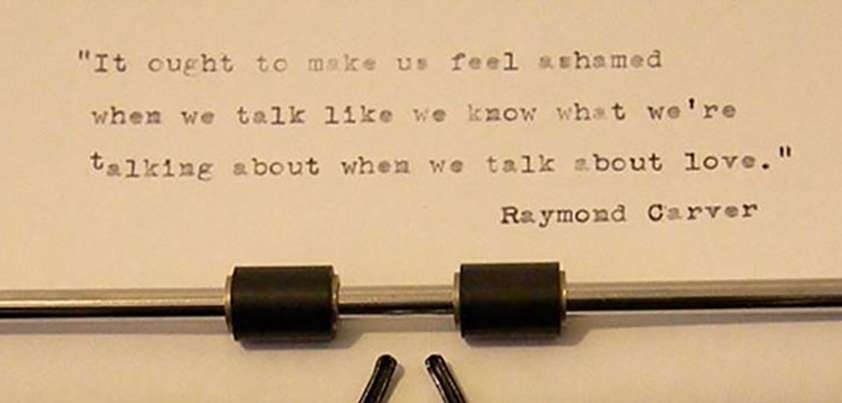 The title of this story by Raymond Carver is somewhat ironic. When protagonist Nancy looks out her bedroom window, she can see the smallest of things. What she can’t see or won’t acknowledge are the big things in her life that need attention. Concern about her open gate and multiple references to fences symbolize three important themes: insecurity, alienation, and fear of the outside world and/or change. Neighbor Sam’s garden pests represent another: inertia (sluggishness). Sam has moved on from his problems in life; Nancy and husband Cliff have not. Other themes: alcohol abuse, regret, emptiness and lack of fulfilment. More…
The title of this story by Raymond Carver is somewhat ironic. When protagonist Nancy looks out her bedroom window, she can see the smallest of things. What she can’t see or won’t acknowledge are the big things in her life that need attention. Concern about her open gate and multiple references to fences symbolize three important themes: insecurity, alienation, and fear of the outside world and/or change. Neighbor Sam’s garden pests represent another: inertia (sluggishness). Sam has moved on from his problems in life; Nancy and husband Cliff have not. Other themes: alcohol abuse, regret, emptiness and lack of fulfilment. More…
Archives
Fat
 Few authors could write as powerful a story about a non-PC topic (body shaming) as Raymond Carver has done here. Major themes are the way we judge people, loneliness and choice. A waitress’s co-workers dehumanize a customer by making fun of his size. They have no empathy for the person within. The experience greatly affects the waitress. She is expecting change. Is it leaving her insensitive partner? Could she, as some readers suggest, be pregnant and worried about getting fat herself? Or has she been inspired to face something about herself that she has been too afraid to address before? More…
Few authors could write as powerful a story about a non-PC topic (body shaming) as Raymond Carver has done here. Major themes are the way we judge people, loneliness and choice. A waitress’s co-workers dehumanize a customer by making fun of his size. They have no empathy for the person within. The experience greatly affects the waitress. She is expecting change. Is it leaving her insensitive partner? Could she, as some readers suggest, be pregnant and worried about getting fat herself? Or has she been inspired to face something about herself that she has been too afraid to address before? More…
Popular Mechanics (Mine / Little Things)
 As anyone who has witnessed an acrimonious divorce knows, sometimes demands over property settlement and custody of children defy logic. This is often because discussions are driven by anger and a desire to hurt or “get back at” the other party as opposed to fairness and what is best for all. In this short story by Raymond Carver, the only major point of argument seems to be which parent will be the main carer for the couple’s baby. Unfortunately, the simple mechanics of a newly formed human body lead to a “Solomon-like” solution that will not please either of them. More…
As anyone who has witnessed an acrimonious divorce knows, sometimes demands over property settlement and custody of children defy logic. This is often because discussions are driven by anger and a desire to hurt or “get back at” the other party as opposed to fairness and what is best for all. In this short story by Raymond Carver, the only major point of argument seems to be which parent will be the main carer for the couple’s baby. Unfortunately, the simple mechanics of a newly formed human body lead to a “Solomon-like” solution that will not please either of them. More…
Cathedral
 In Raymond Carver’s Cathedral, a troubled, disillusioned man with a cynical view of the world is suddenly confronted by his metaphorical blindness. Ironically, the person who brings about this epiphany is a blind friend of his wife. The story begins with the husband full of sarcasm (Maybe I could take him bowling…) as the couple discuss the blind man’s visit. He has pre-conceived ideas about the blind and is surprised when their visitor doesn’t fit the stereotype. Themes include friendship and marriage, insecurity, alienation and loneliness, creativity and imagination, perception (looking vs. seeing). More…
In Raymond Carver’s Cathedral, a troubled, disillusioned man with a cynical view of the world is suddenly confronted by his metaphorical blindness. Ironically, the person who brings about this epiphany is a blind friend of his wife. The story begins with the husband full of sarcasm (Maybe I could take him bowling…) as the couple discuss the blind man’s visit. He has pre-conceived ideas about the blind and is surprised when their visitor doesn’t fit the stereotype. Themes include friendship and marriage, insecurity, alienation and loneliness, creativity and imagination, perception (looking vs. seeing). More…
What We Talk About When We Talk About Love
 The power of this minimalist story from Raymond Carver about the difficulty of defining “real” love lies in its realism. The two couples involved in the alcohol-fueled conversation are not experts; each member has experienced a failed marriage. None of them can describe love, but they do manage to give examples of what it is and isn’t, and what can go wrong when it ends. The mood darkens along with the emptying bottle, and by story’s end all four are too despondent to move. Themes: the nature of love, the limits of language, marriage and divorce, alcohol abuse. More…
The power of this minimalist story from Raymond Carver about the difficulty of defining “real” love lies in its realism. The two couples involved in the alcohol-fueled conversation are not experts; each member has experienced a failed marriage. None of them can describe love, but they do manage to give examples of what it is and isn’t, and what can go wrong when it ends. The mood darkens along with the emptying bottle, and by story’s end all four are too despondent to move. Themes: the nature of love, the limits of language, marriage and divorce, alcohol abuse. More…
Why Don’t You Dance?
 This minimalist story from Raymond Carver captures a brief encounter between a middle-aged man holding a yard sale and a young couple interested in buying furniture. We learn very little about the man other than that he was once in a relationship, is selling almost everything he owns, and probably drinks too much. The man offers the couple whiskey, puts on some music, and suggests that they dance. Carver leaves it to the reader to interpret what happens next. All we know is that the girl is troubled by it for weeks. Possible themes: alcoholism, loneliness, despair, compassion, connection, confusion. More…
This minimalist story from Raymond Carver captures a brief encounter between a middle-aged man holding a yard sale and a young couple interested in buying furniture. We learn very little about the man other than that he was once in a relationship, is selling almost everything he owns, and probably drinks too much. The man offers the couple whiskey, puts on some music, and suggests that they dance. Carver leaves it to the reader to interpret what happens next. All we know is that the girl is troubled by it for weeks. Possible themes: alcoholism, loneliness, despair, compassion, connection, confusion. More…
Where I’m Calling From
 This Raymond Carver story describes how a friendship that develops between two strangers attending an alcohol drying-out retreat puts both on the road to recovery. The story’s message is that while acceptance that you have an alcohol problem is an important first step, true recovery begins when you acknowledge the damage it has caused to the lives of yourself and your loved ones, and are prepared to face up to your demons. The story also recognizes that, post-recovery, there is a high likelihood of a relapse. Themes: substance abuse, alienation, loneliness and the need for human connection, self-awareness, fear, hope.
This Raymond Carver story describes how a friendship that develops between two strangers attending an alcohol drying-out retreat puts both on the road to recovery. The story’s message is that while acceptance that you have an alcohol problem is an important first step, true recovery begins when you acknowledge the damage it has caused to the lives of yourself and your loved ones, and are prepared to face up to your demons. The story also recognizes that, post-recovery, there is a high likelihood of a relapse. Themes: substance abuse, alienation, loneliness and the need for human connection, self-awareness, fear, hope.